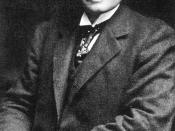"Classical Management" comprises three different approaches:
- Scientific Management (associated with the work of F W Taylor);
- Bureaucratic Management (hierarchical structure associated with the work of M Weber);
- Administrative Management (associated with the work of H Fayol).
The "Human Relations" approach is associated with the work of E Mayo and F Roethlisberger. Immediately, we can see a difference between the ideas of Taylor and Fayol and those of Mayo as they are even classified differently. In order to explain how these managerial ideas differ, I will first explain what those ideas were.
Taylor
Taylor developed the four scientific principles of management:
1. Development of a true science
2. Scientific selection of the worker
3. Scientific education and development of the worker
4. Intimate and friendly cooperation between management and workers.
The focus was on the individual rather than the team, aiming to improve efficiency through production-line time studies.
Each job was broken down into its components and the quickest and best methods of performing each component were designed. There could be only one best way of maximising efficiency, developed through scientific study and analysis. Rewarding productivity was encouraged as money was seen as the one true motivator. Employees did the physical labour and management did the organising and planning. Through standardisation, worker specialisation and tight managerial control, Taylor promised increased efficiency. Although Taylor's methods did not allow scope for individual workers to excel or think for themselves, they were widely adopted.
Fayol
Fayol laid down 14 principles of management to be applied in any situation:
1. Specialization of labour. Specializing encourages continuous improvement in skills and the development of improvements in methods.
2. Authority. The right to give orders and the power to exact obedience.
3. Discipline. No slacking, bending of rules.
4. Unity of command. Each employee...



Great Essay
I found this essay very helpful.
0 out of 0 people found this comment useful.